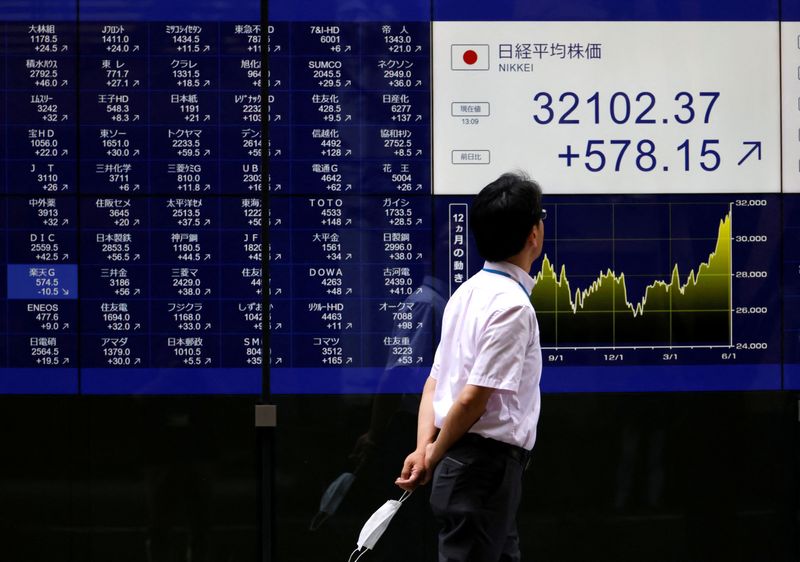Investors see Japanese equities shining brighter on attractive valuations
2023.07.20 07:44

© Reuters. A man looks at an electric monitor displaying a stock quotation board outside a bank in Tokyo, Japan, June 5, 2023. REUTERS/Issei Kato/File Photo
By Divya Chowdhury, Anisha Sircar and Lisa Pauline Mattackal
MUMBAI (Reuters) – Japanese equities continue to look attractive to foreign and local investors, backed by a significant valuation discount to other developed markets, the continuation of loose monetary policy, and progress made by companies on corporate governance.
“We think the land of the rising sun rises again here,” said Mike Reynolds, vice president of investment strategy at Glenmede.
Reynolds, whose firm manages $40.5 billion in assets, now expects a 20% upside in Japanese equity markets, he told the Reuters Global Markets Forum (GMF).
Even after a 26% rally in the Nikkei this year, interest in Japanese stocks is building and is expected to broaden from mega-caps, which have largely caught the interest of foreigners so far, to a wider group of companies in the mid-cap and smaller segments of the market.
“Mid-to-smaller-cap stocks, which have their main business in Japan, are expected to generate better earnings from here,” said Kuniyuki Sugihara, senior portfolio manager at Sumitomo Mitsui (NYSE:) Trust Asset Management in Tokyo.
Sugihara, whose firm manages $645 billion in assets, sees opportunities in tech and financials, while expecting domestic retailers to be boosted by higher local and inbound consumption from overseas tourists.
Sugihara believes any impact from the Bank of Japan’s tweak to its yield curve control (YCC) policy will be “short-lived,” with equity markets recovering quickly, as the central bank will continue its monetary easing policy.
“Dig out a chart of Nikkei and S&P 500 over 30 years, and then a chart of constant currency earnings growth – one of those is the greatest opportunity ever,” said Richard Kaye, portfolio manager at Comgest, which manages $4.3 billion under its Japanese funds.
is trading at a 12-month forward price/earnings ratio of 18.8, versus the broader index’s 14.3. That compares to the ‘s 20.7, well above its 20-year average of 15.8.
Kaye believes Japan’s ‘valuation versus growth’ profile is “the most attractive” among developed countries, while the market also gives investors the opportunity to gain exposure to emerging markets, including India, through companies that export to those markets.
(Join GMF, a chat room hosted on Refinitiv Messenger: )








